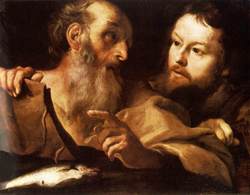The Second Sunday of Easter has many names, as noted
in the title of this post. In some places the theme of mercy is recognized drawing us into the Lord's bountiful mercy: John Paul II recommended the title of Divine Mercy Sunday for this day, too. The most accurate title, however, for today, is "Quasimodo
Sunday" taken from the first two words of the entrance Antiphon at Mass
that speak especially to those baptized at the Easter Vigil: Quasi modo geniti infantes, rationabile, sine dolo lac concupiscite ut in eo
crescatis in salutem si gustastis quoniam dulcis Dominus. (As newborn babes,
alleluia, desire the rational milk without guile, alleluia, alleluia, alleluia.
Rejoice to God our helper. Sing aloud to the God of Jacob (1 Peter 2:2).)


This
second Sunday following Easter is the day on which the newly baptized
officially put away their white robes, it is therefore known liturgically as
"Dominica in albis depositis" or the "Sunday of putting away the
albs."
Today we also hear John 20: 19-31 proclaimed which focuses our
attention on the doubts of Saint Thomas at hearing the news of the risen
Christ.
In his book, The Liturgical Year, Dom Prosper Gueranger writes, "Our
risen Jesus gave an additional proof that he wished the Sunday to be,
henceforth, the privileged day. He reserved the second visit he intended to pay
to all his disciples for this the eighth day since his Resurrection. During the
previous days, he has left Thomas a prey to doubt; but to-day he shows himself
to this Apostle, as well as to the others, and obliges him, by irresistible
evidence, to lay aside his incredulity. Thus does our Saviour again honour the
Sunday. The Holy Ghost will come down from heaven upon this same day of the
week, making it the commencement of the Christian Church: Pentecost will
complete the glory of this favoured day."


The blog "Shouts in the Piazza" notes:
In Victor Hugo's book, "The Hunchback of Notre Dame" a misshapen baby was left in the portico of Notre Dame cathedral on the second Sunday of Easter (i.e. Quasimodo Sunday) and so his adoptive father had him baptized with this name. The words quasi modo mean "as if in (this) manner" so it seemed fitting that the poorly formed child should be named an "as if".
Yes, precisely... Victor Hugo got it right.
Hugo gives us something to consider in prayer... "As if in this manner the Lord has spoken..."
Given tomorrow is the liturgical memorial of Blessed Margaret of Castello (look at the post on her tomorrow) there are things to pray about....
Peace to you, Rory! Thanks for writing.
The most accurate title for this Sunday is what the Church has named it "the Second Sunday of Easter, Divine Mercy Sunday.
We must follow exactly what the Church teaches. We don't need any nicknames for this day.
Dear Robert,
PAX!
There is flexibility is title for this Sunday. The Roman Missal (2002) indicates "Second Sunday of Easter OR Divine Mercy Sunday." I used the the alternate, and older names for the liturgical feast of the day of Easter; they are not "nicknames" in strict use of the way you are thinking. Not to mention, I occasionally appeal to the Roman Missal (1962) to flesh out a fuller sense of our liturgical life. This blog follows Church teaching uncompromising, especially regarding the sacred Liturgy. You may have noticed that I posted a separate post on "Divine Mercy Sunday" this year.
Thanks for reading the Communio blog and writing to me.
PAZ